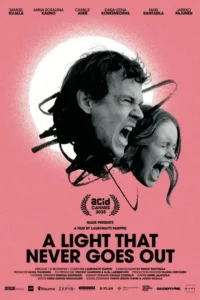Last updated on June 8, 2025
A film by Nadav Lapid
With: Ariel Bronz, Naama Preis, Efrat Dor, Aleksey Serebryakov, Sharon Alexander
Israel, in the aftermath of October 7. Y., a jazz musician struggling to make ends meet, and his wife Jasmine, a dancer, sell their art, souls and bodies to the elite, and bring pleasure and consolation to a bleeding nation. Soon, Y. is given a mission of the highest importance: setting to music a new national anthem.
Our rate: **(*)
Nadav Lapid said it on stage at the Théâtre Croisette: Yes was probably the most important film he could have made, and his stage fright was genuine when he unveiled it to the public. Released before October 7, the film takes a very different turn and becomes a vital necessity for the artist, who rediscovers the experimental verve so notable in Synonyms. Its opening, a wild musical comedy criticizing vulgarity, is a model of its kind, dynamic, perfectly choreographed, staged, in sound and images, the first part heralds a flamboyant film. The rest of the film proves us wrong. The Israeli director, who has long had a love-hate relationship with his country, seeks above all to share with us the changing opinions of a pianist and artist who, after October 7, harbors feelings of revenge and breaks the frenzied balance he had with his wife Yasmine and their children. Of course, as is often the case with Lapid, the characters are abstract, representing entities whose thoughts far exceed them. Certainly, rather than Y and Yasmine, the couple could just as easily have been called Israel and Palestine. Throughout the 2½ hours of the film, Lapid delivers an anti-anthem, anti-nationalist diatribe, appealing to the viewer’s intelligence. Like Pasolini, he dares to share with us the abject thoughts of his main character, then his slight questioning of them. He does not opt for neutrality or healthy distance; on the contrary, he chooses to follow his steps and thoughts, sometimes in an explosive way. In contrast, there is the war, Israel taking revenge on Palestine, Netanyahu making increasingly radical and inhumane decisions. But also, the horrific account, with details supporting the Hamas terrorist attacks on October 7. A shaking camera, exploding sounds, Lapid dares. Sometimes too much, sometimes too long or too repetitively. But he dares. Even to the point of humor, unexpected, coming out of nowhere. Even looking directly into the camera and addressing the viewer: what would he have done if he were Israeli? The question is posed, and as a radical denouncer of fascism, populism, and wait-and-see attitudes, Lapid divides opinion. Yes will be both applauded and booed, sometimes for the wrong reasons (fixed political opinions, when the film seeks instead to convey the multitude of factors to be taken into account, and therefore the relative complexity of the issue).











Be First to Comment